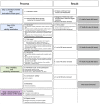Development and Validation of a Mobile-Centered Digital Health Readiness Scale (mDiHERS): Health Literacy and Equity Scale
- PMID: 39137409
- PMCID: PMC11350292
- DOI: 10.2196/58497
Development and Validation of a Mobile-Centered Digital Health Readiness Scale (mDiHERS): Health Literacy and Equity Scale
Abstract
Background: There has been a rapid expansion of digital health care services, making the need for measuring and improving digital health readiness a priority. In response, our study team developed the Mobile-Centered Digital Health Readiness: Health Literacy and Equity Scale (mDiHERS) to measure digital health readiness.
Objective: We aim to develop and validate a scale that assesses digital health readiness, encompassing literacy and equity, and to ensure the effective use of mobile-centered digital health services.
Methods: This study was conducted from October 2021 to October 2022 to develop and validate the mDiHERS. Participants included patients with inflammatory bowel disease, which is a chronic condition requiring continuous management, and experts in medical and nursing informatics. The scale development involved a literature review, focus group interviews, and content validity evaluations. A total of 440 patients with inflammatory bowel disease were recruited for the validation phase, with 403 completing the survey. The scale's validity and reliability were assessed through exploratory factor analysis and Cronbach α. The scale was translated into English by translators and bilingual and native researchers, ensuring its applicability in diverse settings.
Results: The mDiHERS consists of 36 items across 6 domains, with a 5-point Likert scale for responses. The validation process confirmed the scale's construct validity, with 4 factors explaining 65.05% of the total variance. The scale's reliability was established with Cronbach α values ranging from 0.84 to 0.91. The scale's development considered the technical proficiency necessary for engaging with health mobile apps and devices, reflecting the importance of subjective confidence and objective skills in digital health literacy.
Conclusions: The mDiHERS is a validated tool for measuring patients' readiness and ability to use digital health services. The mDiHERS assesses user characteristics, digital accessibility, literacy, and equity to contribute to the effective use of digital health services and improve accessibility. The development and validation of the mDiHERS emphasize the importance of confidence and competence in managing health digitally. Continuous improvements are necessary to ensure that all patients can benefit from digital health care.
Keywords: GI; IBD; adoption; assessment; assessments; bowel; chronic; digital health; e-health; eHealth; gastroenterology; gastrointestinal; health equity; health literacy; inflammation; inflammatory; inflammatory bowel diseases; internal medicine; literacy; mHealth; measure; measurement; measurements; measures; mobile health; mobile phone; patient participation; readiness; scale; scales; telemedicine; validate; validation.
©Hana Kim, Rebecca Schnall, Nagyeom Yoon, Seong-Joon Koh, Jisan Lee, Jae Hee Cheon. Originally published in the Journal of Medical Internet Research (https://www.jmir.org), 13.08.2024.
Conflict of interest statement
Conflicts of Interest: None declared.
Figures


References
-
- What is digital health? U.S. Food and Drug Administration. 2022. Sep 22, [2024-06-28]. https://www.fda.gov/medical-devices/digital-health-center-excellence/wha... .
-
- Istepanian RSH, AlAnzi T. Mobile health (m-health): evidence-based progress or scientific retrogression. Biomed Inform Technol. 2019:717–733.
-
- Maier E, Reimer U, Wickramasinghe N. Digital healthcare services. Electron Mark. 2021;31(4):743–746. doi: 10.1007/s12525-021-00513-z. https://europepmc.org/abstract/MED/35602115 513 - DOI - PMC - PubMed
-
- Condry M, Quan XI. Digital health innovation, informatics opportunity, and challenges. IEEE Eng Manag Rev. 2021;49(2):81–88. doi: 10.1109/emr.2021.3054330. - DOI
Publication types
MeSH terms
LinkOut - more resources
Full Text Sources
Medical

